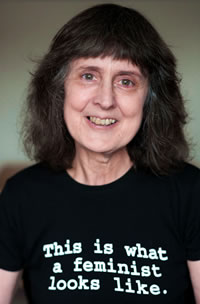(This is a short version of Feminist Epiphanies, a paper given at the Scottish Women’s Liberation Movement History Workshop at the University of Edinburgh, May 2009. Click here for the full version.)
I got involved with 1970s feminism the way some people get involved with religious cults.
People join cults because they’ve been living their lives with their heads full of unanswered questions, and suddenly they run into an individual or group that seems to have the answers. That was how it was for me in 1969 when I first encountered the words women’s, liberation and movement side by side in the same phrase.
Why had I been brought up with the idea that it was OK – mandatory, even – for girls to strive and achieve and pass exams, while those same activities would mark an adult woman as unfeminine? Why did boys urge you to have sex with them but despise you if you gave in? Why couldn’t I get a free, safe abortion if I needed one? Why weren’t nuns good enough to serve at a Catholic mass, while ten-year-old boys were? Why, when I worked in my holidays, did I get less money than boys doing the same job? Why did my mother – who, in her own words, had “everything I ever wanted” (she meant a house, my father, my sisters and me) – spend so much of her time in states of exhaustion, frustration and unhappiness?
The answer was contained in one word: patriarchy.
Overthrowing patriarchy was about more than political campaigning for equal rights, important though that was. Like many cults, 1970s feminism was as much about lifestyle as it was about ideology.
The personal was political. I moved into a commune. I spurned fancy clothes and make-up, since these would send out the wrong signals to men looking for the sorts of women who use fancy clothes and make-up to send out the wrong signals. I adopted the title “Ms”, and got into public arguments with officials who tried to stop me using it. I didn’t go the whole hog with my name: some women cast off the surnames with which they had been saddled by their fathers or husbands, adopting instead a name which established the link with their mothers. If I had gone down this route, I would have become Zoë Isabelschild. It sounded OK, and no more likely to be misspelt than the original, but there were limits, even for me. I was just getting started as a writer, and I wasn’t going to shoot myself in the foot by changing my name.
I wouldn’t have changed it if I had married. And that was out of the question once I read Germaine Greer’s ringing words in The Female Eunuch – “if women are to effect a significant amelioration in their condition, it seems obvious that they must refuse to marry”. I broke off my engagement.
(I have spoken in more detail about this issue in Lizzie Thynne’s short film YBA Wife?, which you can see here).

Feminism even offered jobs. I was employed at the London-based Women’s Research and Resources Centre (now the Feminist Library), Spare Rib magazine and the Pregnancy Advisory Service. I joined a women’s short story writing group and, together with Sara Maitland, Valerie Miner, Michele Roberts and Michelene Wandor, wrote and published two books of feminist short stories – Tales I Tell My Mother, and More Tales I Tell My Mother. I was a founder-member of the advisory group of the feminist publisher Virago, and published two novels with them.
People asked, “Which are you first, a writer or a feminist?” To me it was a false distinction. No-one was telling me to stay on message. No-one was telling me what the message was. I was writing about the world as it appeared to me, which is what all writers do.
Cults often have charismatic leaders, dodgy individuals who seek to brainwash their devotees, exploit them sexually and take their money. If anyone had tried that with me, I would surely have succumbed, besotted as I was by all things feminist. But I was quite safe: 1970s feminism wasn’t that well organised, and we didn’t do “leaders”. Everything was decided by consensus, which meant that meetings went on for hour upon hour until one side remembered it had a home to go to and shuffled out, exhausted. The fittest prevailed – until next time. For this reason I probably spent much of the ’70s with that wide-eyed sleep-deprived look so characteristic of cultists who throw themselves into their beliefs 24-7.
1970s feminism wasn’t really a cult – it was a much-needed political movement which filled a cult-shaped space in my life. For me, 1970s feminism arrived at just the right moment, and whatever may still be wrong in sexual politics (and plenty is still wrong) things are immeasurably better now than they were under the dreary dead hand of pre-70s patriarchy. I’m not a cultist any more, but I’m still happy to call myself a feminist – and to look like one.

I’ve written in more detail about ’70s feminism in the pamphlet Saying What We Want. To read it, click here.
Click here for more on the Feminist Seventies.
Click here for the Sue Innes Memorial Lecture.
Click here for Feminist Publishing.
Click here for Celebrating the History of Feminism in St Andrews.
